Yes!
Yes!
Partly, for me this is an autistic/HSP thing. When I’m talking to someone, I get so much social information from them that I have to interpret (body language, gestures, speech, tone, eye contact). And if I try to follow too many people’s reactions... I can’t process it. It’s totally overwhelming.
It’s easier if I know someone well enough to have ‘shorthand’ for it. So I can talk to maybe 3 relatives, or 1 stranger.
The other part is handling my own internal reactions and processing, which are all pretty conscious and not automatic.
Normal ‘communication’ stuff.
Did they understand what I just said? Do I need to rephrase or explain something?
Their emotional response.
Are they bored? Uncomfortable? Do they want to say something?
What do I need to do to make sure they’re comfy and happy?
My emotional response.
If someone is bored: oh my god insecurity. If I wasn’t totally sure I wanted to say the thing: reluctance and anxiety. If I’m having trouble saying what I mean and they’re losing interest: panic.
This weird sense that I’m ...responsible for their social experience, kinda?
Am I “contributing”? Which way should we go from here?
Like. One person of that is enough to handle. (And that stuff is worse with people I know really well, because I care more about what they think.)
Having this stuff spinning in my head is involuntary. But at least, if I’m in a big group, I can tune out the others if I pick one person to focus on.
Also, trying to people-please with more than one person -- when sometimes people want conflicting things -- and then, you’re trying to weigh whose approval is more important to you -- that’s just ... ugh, Doom Spiral.
a question for people with avpd
when you’re in a group of people, do you ever find yourself interacting with only one person in that group and ignoring the rest?
even if you’re comfortable with most people in the group individually, does that change if you come together as a group?
More Posts from Zella-rose and Others
when you realize every action you’ve ever taken has been to make sure you occupy as little space in the world as possible, even your lunch order


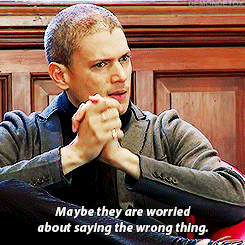
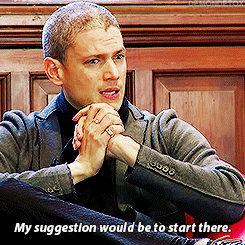
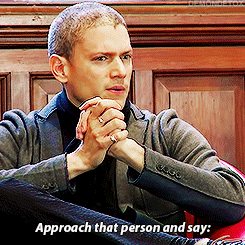

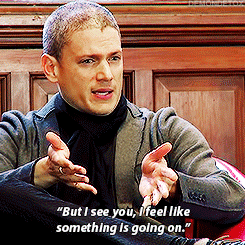
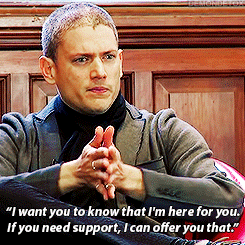
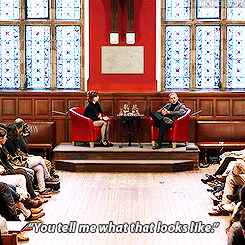
“In that way, you’ve acknowledged that you’re unsure, that you don’t know what to do or say. You’ve acknowledged that you see them. They feel seen. They feel heard and acknowledged, which is huge for someone who’s in crisis.” Wentworth Miller | Q&A at Oxford Union | 2016 | x
Your mixed feelings about your parents are valid.
Shout out to people like me who have parents who are loving but are black holes of emotional labor… It took me a long time to realize that it’s okay to have mixed feelings about your parents, about your relationship with them.
Sometimes parents can love you but be somewhat toxic to you and your growth, and that’s a very hard realization to come to if you, like me, grew up extremely close to them.
Sometimes parents can love you genuinely but lack emotional maturity, forcing you to perform disproportionate amounts of emotional labor. Some parents manifest symptoms of their mental illness in ways that are toxic to your mental illness.
Some parents, like mine, try so hard to be good parents but fall back on habits of emotional manipulation because they haven’t processed their own traumas and are modeling behavior they grew up with. That doesn’t make their behavior acceptable, and it’s okay to feel exhausted and hurt when they betray you. You don’t have to forgive every mistake.
I want you to know that it’s okay to protect yourself, to need some space apart from them. The love you have for your parents is still valid, and you are making the right decision.
Placing a safe emotional distance between myself and my parents has been one of the most difficult, heartbreaking processes I’ve ever gone through… it hurts to try to curb the strength of your own natural empathy around people you love. It feels disingenuous to your heart’s natural state.
But I promise you, you are not hard-hearted or ungrateful, and you are not abandoning them. You are making a decision about your own emotional, mental, and spiritual health.
I know what it’s like in that confusing grey area of love mixed with guilt and anxiety, of exhaustion and quasi-manipulation and unreciprocated emotional labor, and I promise you, you are not alone.
Your mixed feelings about your parents are valid.
I know covid 19 has been going on for long. It is terrible and I hope with all my heart that it is over soon. I want you to know that following the restrictions save lives, and it’s okay if they make you sad. It’s okay if everything seems harder now than in the first months. We have been in this a long time and now it’s (for some of us atleast) very dark outside. It is hard. It is lonely, but we got to keep on going. We will make it. There is light ahead with vaccines. More and more restrictions may be added, dependent on where we each live. It will be okay again. Hang in there. For what it is worth: You are not alone and your feelings are valid. It’s scary and it may be getting to you a lot more now as the months went on. Winter is already a tough season for many people. Adding covid 19 on top of that? That is a lot. Do not beat yourself up. Hang in there, do what you can to take care of yourself and talk to someone.
We will make it through. It will be hard, but we will make it. 🌸
AvPD theory: social perfectionism
Avoidance as social perfectionism.
“This relationship will be doomed from the start ... so there’s no point trying to make friends.”
“I’ll inevitably say stuff wrong and make things awkward ... so there’s no point in starting a conversation.”
“I might be having a good day, but I won’t always be energetic, clever and likable ... so there’s no point in reaching out.”
These examples share some common links:
negative self-esteem
avoidance of anxiety/discomfort
seeking control and certainty
trying to meet others’ expectations, or avoid disappointing them
Thoughts, anybody?
(more here!)
In this post I mentioned how, even in a good relationship with someone, I still question whether they’re going to reject me when I let them see things about myself. Even though I have no reason to think they would.
That’s part of how I differentiate normal, “reasonable” fears from disorder-y, “unreasonable” fears, now.
Is it connected to the real situation? Does it depend on actual facts, interactions, history? Or is it detached from all that -- “it exists no matter what’s actually happening,” “nothing that happens could make me feel confident and relaxed” -- is it an arbitrary fear.
And if it’s arbitrary? Then I know it’s not grounded in reality. I am feeling afraid because my mind tells me I should be afraid -- because of my mind, not because of the situation I’m in.
That could be an invalidating way to think, for some people. (People vary!! If it’s not useful for you, don’t feel bad for throwing it out!) But for me, it’s been very powerful. Because if the only “no” I have is from a fear that isn’t connected to the real, present situation, then I am actually free to choose whatever I want. Including trusting someone I love, and showing them the thing, and allowing myself to be seen and loved in return.
And that is, I think, what is allowing me to slowly, really heal. “Corrective experiences,” perhaps, to replace the ones that taught me to be afraid in the first place.
Adult realization: you will make mistakes, you will act irrationally. You will commit some wrongs that cannot be fully righted. People will dislike you and misunderstand you for all sorts of reasons. None of these make you a bad person. All you can do is try your best to be kind and just to people, grow and learn.
It doesn’t make you unlovable or a horrible person if you don’t have many friends. It can be difficult to meet new people if you’re shy or quiet or have anxiety. It can be difficult to stay in touch with people if you can’t find the time or energy to remain in contact. It can be difficult to make new friends if you struggle to find people you click with or who are interested in the same things as you. None of those things mean you’re unlovable.
AvPD theory: social dysregulation
Part of Avoidant Personality Disorder is like ... a failure to regulate social experiences. Like we don’t properly integrate or process what we feel.
Interacting with someone means feeling visible, connected, and like you are a self-among-selves: you’re existing as a person, in the presence of others.
Most folks, of course, can handle that effortlessly. They even seek it out.
People need social ‘background noise’ and social stimulation.
They reach out easily and often, just because it feels good to them.
Socializing gives them a sense of comfortable connectedness. And relief from isolation -- they don’t “exist in a vacuum.”
It helps smooth out their inner experiences, thoughts and feelings.
But with AvPD, I don’t think we process social input normally.
The sensations of interacting don’t feel like how most people feel them. Being visible, connected, a person -- it just seems dangerous and harsh.
And we can’t put these feelings into context.
We can’t step back from them, or control how much they affect us.
We don’t have the ability to regulate what we’re experiencing.
That means nearly all social stimuli are negative to us, whether friend or foe. Being-in-contact-with-people is all it takes to distress us.
It’s overwhelming and de-stabilizing.
It provokes more big feelings, and reactions we don’t feel safe facing.
Our inner experience is turned into chaos.
We’re left feeling helpless, afraid, inexplicably ashamed.
We want positive connection. But we usually end up with painful chaos instead.
And it’s a thousand times worse if you’re having an actually negative encounter, like facing someone who’s angry or criticizing you.
Social perfectionism is about trying to escape this:
“I might be able to enjoy this thing... but only if nothing goes wrong ever.”
Perfectionism is a great misdirect. Because “every possible problem” is not the issue that needs solving.
What we need to do, is learn how to experience social input in a positive way. And un-learn all the bad habits that have grown instead.
(more here!)
-
 heavenschild666 liked this · 10 months ago
heavenschild666 liked this · 10 months ago -
 vegetalfeline liked this · 2 years ago
vegetalfeline liked this · 2 years ago -
 solarwindsempire liked this · 2 years ago
solarwindsempire liked this · 2 years ago -
 one-good-day reblogged this · 5 years ago
one-good-day reblogged this · 5 years ago -
 dragonshine liked this · 5 years ago
dragonshine liked this · 5 years ago -
 aterminalcase liked this · 7 years ago
aterminalcase liked this · 7 years ago -
 nvtsumi liked this · 7 years ago
nvtsumi liked this · 7 years ago -
 goblinofthesun liked this · 7 years ago
goblinofthesun liked this · 7 years ago -
 apparently-adhd reblogged this · 7 years ago
apparently-adhd reblogged this · 7 years ago -
 doublehelixofcrows liked this · 7 years ago
doublehelixofcrows liked this · 7 years ago -
 moniblues liked this · 8 years ago
moniblues liked this · 8 years ago -
 novaccaine liked this · 8 years ago
novaccaine liked this · 8 years ago -
 vargamorwoman liked this · 8 years ago
vargamorwoman liked this · 8 years ago -
 blue-sialia liked this · 8 years ago
blue-sialia liked this · 8 years ago -
 snailjamboree liked this · 8 years ago
snailjamboree liked this · 8 years ago -
 trevorfindsthestrals liked this · 8 years ago
trevorfindsthestrals liked this · 8 years ago -
 shriimppraamen liked this · 8 years ago
shriimppraamen liked this · 8 years ago -
 oswednesday reblogged this · 8 years ago
oswednesday reblogged this · 8 years ago -
 diue-est-une-femme liked this · 8 years ago
diue-est-une-femme liked this · 8 years ago -
 bloodsweatandfears liked this · 8 years ago
bloodsweatandfears liked this · 8 years ago -
 bambibaddie liked this · 8 years ago
bambibaddie liked this · 8 years ago -
 avalynn-blog1 reblogged this · 8 years ago
avalynn-blog1 reblogged this · 8 years ago -
 vanna-toska reblogged this · 8 years ago
vanna-toska reblogged this · 8 years ago -
 cyborg-prince liked this · 8 years ago
cyborg-prince liked this · 8 years ago -
 bpdpastels reblogged this · 8 years ago
bpdpastels reblogged this · 8 years ago -
 letuskeepdreaming liked this · 8 years ago
letuskeepdreaming liked this · 8 years ago -
 uriera reblogged this · 8 years ago
uriera reblogged this · 8 years ago -
 uriera liked this · 8 years ago
uriera liked this · 8 years ago -
 avpdkaneki reblogged this · 8 years ago
avpdkaneki reblogged this · 8 years ago -
 ferrret liked this · 8 years ago
ferrret liked this · 8 years ago -
 strawberryliptint liked this · 8 years ago
strawberryliptint liked this · 8 years ago -
 theweedman liked this · 8 years ago
theweedman liked this · 8 years ago -
 glamfloyd liked this · 8 years ago
glamfloyd liked this · 8 years ago -
 marsvioletsixtyfour liked this · 8 years ago
marsvioletsixtyfour liked this · 8 years ago -
 emotionslustlove liked this · 8 years ago
emotionslustlove liked this · 8 years ago -
 shhhhhhq reblogged this · 8 years ago
shhhhhhq reblogged this · 8 years ago -
 cxsmicjxke reblogged this · 8 years ago
cxsmicjxke reblogged this · 8 years ago -
 catastrophisng reblogged this · 8 years ago
catastrophisng reblogged this · 8 years ago -
 age-of-the-taco liked this · 8 years ago
age-of-the-taco liked this · 8 years ago -
 slippery-minghus reblogged this · 8 years ago
slippery-minghus reblogged this · 8 years ago -
 i-am-slippery-minghus liked this · 8 years ago
i-am-slippery-minghus liked this · 8 years ago -
 liebrenado liked this · 8 years ago
liebrenado liked this · 8 years ago
